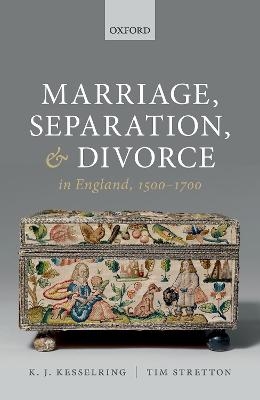
Marriage, Separation, and Divorce in England, 1500-1700
Oxford University Press (Verlag)
978-0-19-284995-3 (ISBN)
England is well known as the only Protestant state not to introduce divorce in the sixteenth-century Reformation. Only at the end of the seventeenth century did divorce by private act of parliament become available for a select few men and only in 1857 did the Divorce Act and its creation of judicial divorces extend the possibility more broadly. Aspects of the history of divorce are well known from studies which typically privilege the records of the church courts that claimed a monopoly on marriage. But why did England alone of all Protestant jurisdictions not allow divorce with remarriage in the era of the Reformation, and how did people in failed marriages cope with this absence? One part of the answer to the first question, Kesselring and Stretton argue, and a factor that shaped people's responses to the second, lay in another distinctive aspect of English law: its common-law formulation of coverture, the umbrella term for married women's legal status and property rights. The bonds of marriage stayed tightly tied in post-Reformation England in part because marriage was as much about wealth as it was about salvation or sexuality, and English society had deeply invested in a system that subordinated a wife's identity and property to those of the man she married. To understand this dimension of divorce's history, this study looks beyond the church courts to the records of other judicial bodies, the secular courts of common law and equity, to bring fresh perspective to a history that remains relevant today.
K.J. Kesselring is a Professor of History at Dalhousie University in Halifax, Canada. She has published works on early modern English law, crime, and politics, including books on the royal pardon, the Northern Rebellion of 1569, and homicide, as well as a series of articles and book chapters on such topics as felony forfeiture and the Court of Star Chamber. She has also edited or co-edited several volumes of essays and primary sources, including a collection of essays on the history of coverture co-edited with Tim Stretton: Married Women and the Law: Coverture in England and the Common Law World. Tim Stretton is a Professor of History at Saint Mary's University in Canada and has published widely on the topics of women, litigation, law, and literature. He is the author of Women Waging Law in Elizabethan England (1998), the editor of Marital Litigation in the Court of Requests, 1542-1642 (2008) and co-editor (with Krista Kesselring) of Married Women and the Law: Coverture in England and the Common Law World (2013).
| Erscheinungsdatum | 17.02.2022 |
|---|---|
| Verlagsort | Oxford |
| Sprache | englisch |
| Maße | 160 x 241 mm |
| Gewicht | 464 g |
| Themenwelt | Geschichte ► Allgemeine Geschichte ► Neuzeit (bis 1918) |
| Geisteswissenschaften ► Geschichte ► Regional- / Ländergeschichte | |
| Geschichte ► Teilgebiete der Geschichte ► Militärgeschichte | |
| Recht / Steuern ► Rechtsgeschichte | |
| ISBN-10 | 0-19-284995-6 / 0192849956 |
| ISBN-13 | 978-0-19-284995-3 / 9780192849953 |
| Zustand | Neuware |
| Haben Sie eine Frage zum Produkt? |
aus dem Bereich


